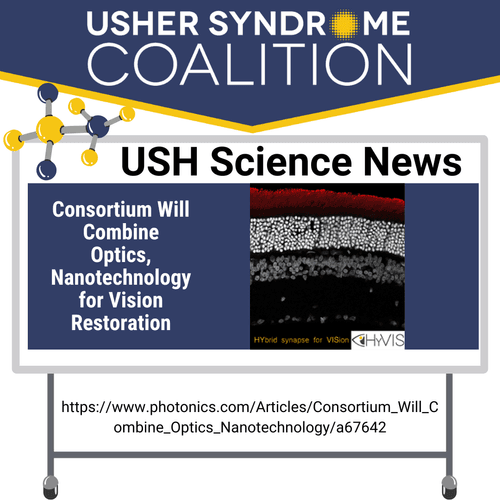Grounded in Science
A balance of research news and well-being for the Usher syndrome community.
Hello! 2023 continues to be a year with promising, meaningful goals coming to fruition. We have been working tremendously hard behind the scenes on several initiatives and continue to thank you for your patience!
In the meantime, we would love to thank those who have been filling out the surveys in the Usher Syndrome Data Collection Program (USH-DCP), powered by RARE-X. The data is already showing some interesting correlations. The more who register on this platform the more data it provides to researchers, improving our understanding of Usher syndrome!
Learn more here and watch our informational webinar: English | español.
Research Spotlight
RUSH2A Natural History Study: Rate of Progression in USH2A-related Retinal Degeneration
In the spring of 2017, the Foundation Fighting Blindness launched a natural history study known as RUSH2A, which spanned 20 clinical sites globally. A natural history study “is a preplanned observational study intended to track the course of the disease.” Jacque Duncan, MD, chairs the RUSH2A study, which aims to understand the natural history of disease progression in individuals with USH2A mutations, which can cause vision loss only, or both vision and hearing loss.
For people with USH2A, the progression and symptoms can vary widely, which makes it difficult to design clinical trials to test investigational products and to offer prognoses. This multi-year natural history study with 127 participants provides researchers with data to map disease progression and structural changes in the eyes over a more extended period.
Information collected from this study can be used to accelerate the development of outcome measures for clinical trials. In this USH Talk, Dr. Jacque Duncan explains the importance of this natural history study and its impact on helping to find a treatment.
Data from the RUSH2A study should be revealed later this year, so please stay tuned to our monthly “Grounded in Science” newsletter and the Usher Syndrome Coalition website for updates!
In Case You Missed It: Science News Feature
Consortium Will Combine Optics, Nanotechnology for Vision Restoration
Original Publication Date: January 3, 2021
What this means for Usher syndrome: Vision loss in Usher syndrome is caused by retinitis pigmentosa (RP). This initiative is attempting to develop a therapy for RP. The project will last four years with the final goal of developing a way to restore sight. It is in its early stages but could potentially offer a way to restore vision in Usher syndrome patients.
For more science news, check out our Science News page, organized by treatment approach and type of Usher syndrome.
On Well-Being: Feeling Your Feelings
Receiving an Usher syndrome diagnosis evokes a lot of emotions. It is overwhelming to be told that you are going deaf and blind or that your child will one day be deaf and blind. It’s completely normal and acceptable to feel fear associated with these losses; fear of progressive loss, fear of the unknown...
USH Life Hack of the Month
(Send your USH life hacks to info@usher-syndrome.org.)
Relay Conference Captioning service, or RCC, can help anyone who is deaf or hard of hearing engage in group conversations in a videoconference, multi-party conference call, or webinar. Using the same high-quality captioners that produce closed captioning for television, RCC users receive free, live, real-time text streamed to a computer connected to the Internet anywhere. Not all states offer this service. Here is a list of those that do:








